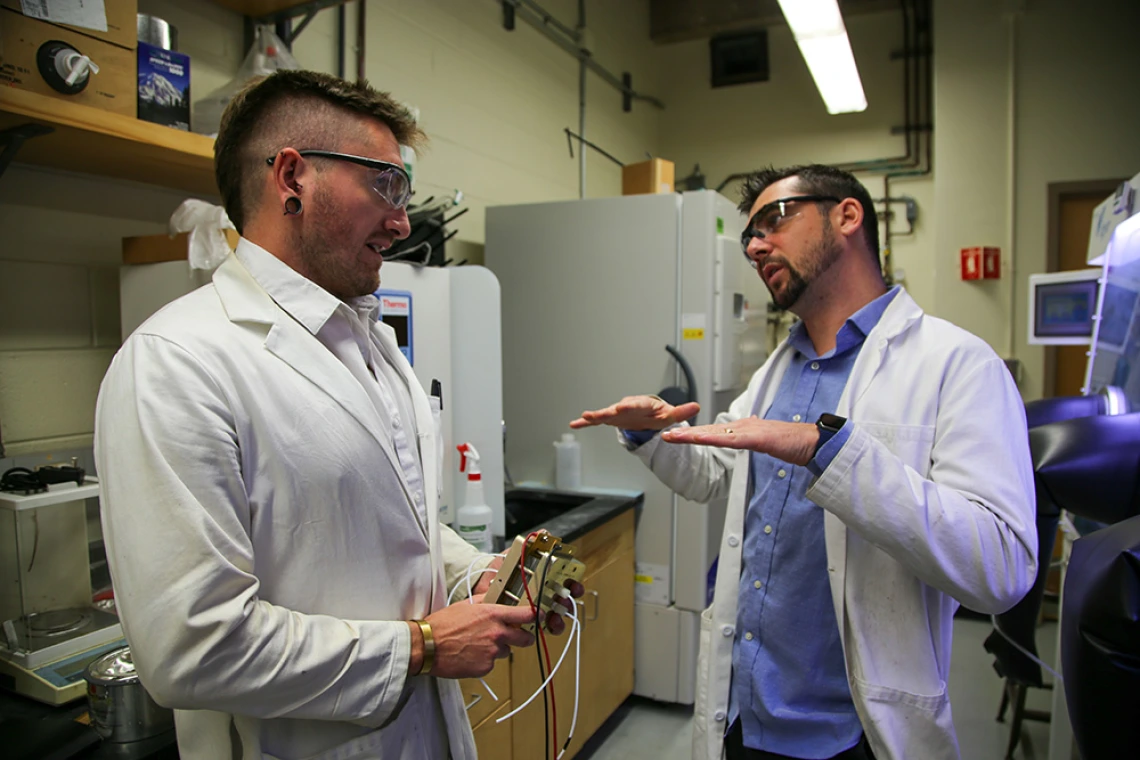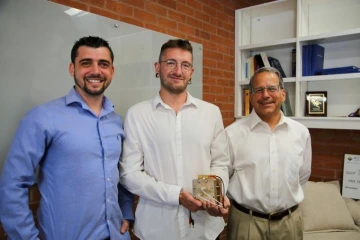Solving renewable energy challenges with a new kind of nontoxic battery
With a new startup called CarbeniumTec, researchers in the College of Science and the College of Medicine – Tucson aim to bring new technology to the market that reimagines how electricity is stored.

Thomas Gianetti (right), assistant professor in the Department of Chemistry and Biochemistry, and co-founder and chief executive officer of CarbeniumTec, chats with Joules Moutet in the team's lab.
Paul Tumarkin/Tech Launch Arizona
University of Arizona researchers have developed a metal-free electrolyte that they plan to use to make nontoxic batteries that can store large amounts of electricity – technology they hope helps solve a persistent challenge with renewable energy: where to store the energy before it gets used.
The team of researchers, from the College of Science and College of Medicine – Tucson, has launched a startup called CarbeniumTec LLC to further develop the technology and bring it to the marketplace with the help of Tech Launch Arizona, the office of the university that commercializes inventions stemming from research.
"We strive to develop a sustainable, metal-free and environmentally friendly solution that addresses the increasing demand for electricity storage," said co-inventor Thomas Gianetti, assistant professor in the Department of Chemistry and Biochemistry, and co-founder and chief executive officer of CarbeniumTec.
The technology is not intended to replace compact, portable battery systems such as lithium-ion batteries needed for cell phones, cameras, laptops, electric vehicles, and other products. But it addresses an urgent and growing need for more methods to store and deliver large amounts of electricity for a long period of time. In Arizona, for example, the need for energy storage is expected to increase by 3,000 megawatt-hours by 2030, Gianetti said. The average American home uses just shy of 11 megawatt-hours of energy in a year.
Renewable energy, stored sustainably
One of the main problems with green energy production, such as solar and wind energy, is that it is produced intermittently, which means it needs to be stored in large quantities for extended periods of time before it gets used. The sun provides energy during the day, for example, but we use energy around the clock, Gianetti said. Lithium-ion-based batteries are currently dominating the stationary energy storage sector, but they are best suited for 4 to 6 hours of storage. To achieve longer-term emissions reduction goals and take full advantage of alternative forms of energy, Gianetti said the world will need safe and environmentally friendly systems able to store energy for 8 to 12 hours.
The researchers' goal is to create a new kind of battery to address this problem – one that can store large quantities of energy and provide it later and for a long period of time – without using lithium, rare earth metals, heavy metals, or other materials that are toxic and not widely available.
Gianetti came to UArizona in 2017 to study novel chemistry and started developing his battery project in late 2019. CarbeniumTec co-founder and chief technology officer Jules Moutet joined Gianetti's lab as a postdoctoral research associate in January 2020.
Current state-of-the-art redox battery technologies use corrosive chemicals that are toxic and difficult to use, expensive, and harmful to the environment. The system Gianetti and Moutet developed leverages a proprietary metal-free, nontoxic electrolyte based on organic chemistry.
They invented a new type of organic-based reduction-oxidation, or redox, flow battery. Redox flow batteries store and discharge energy through changes in charge states of ions kept in chemical solutions that are recirculated by pumps.
Prototype on the horizon

Gianetti and Moutet with TLA commercialization partner Philip Lacovara, CarbeniumTec's third co-founder and chief organization officer.
Paul Tumarkin/Tech Launch Arizona
The team worked with Laura Silva, a senior licensing manager at Tech Launch Arizona, to protect the intellectual property. They further developed the technology with supplemental funding provided through TLA's Asset Development Program. They also participated in the National Science Foundation I-Corps customer discovery program offered by TLA, and were subsequently accepted into the national-level program.
"It is a pleasure to work with Dr. Gianetti and Dr. Moutet, who have developed an elegant solution to meet a current commercial need and are committed to making it real," Silva said.
They also worked with Philip Lacovara, a TLA commercialization partner, to develop business strategies to bring the invention to market and license the technology to a UArizona startup. Lacovara is the third co-founder of CarbeniumTec and serves as chief organization officer.
"Phil brought the business aspects to the team," Gianetti said. "We don't know where we would be without him."
CarbeniumTec is based at the UA Tech Park at Rita Road where they are part of the UArizona Center for Innovation (UACI). The startup recently won the UACI Sponsored Launch Fueled by Perkins Coie LLP competition, which provided CarbeniumTec with one sponsored year of admission at the center.
Gianetti has received wide recognition for his innovative work, including being named among Research Corporation for Science Advancement's 2021 Cottrell Scholars. Most recently, he was selected to receive the 2022 University Early Career Innovation and Entrepreneurship Award in recognition of his commitment to promoting the translation of research to the public for the benefit of society, and the 2022 Early Career Scholar Award, which recognized his outstanding contributions to teaching, creative activities, and service.
The team plans to build a small-scale prototype and hopes to secure an initial contract to demonstrate a scaled-up version of the technology in the near future. For now, the Gianetti and Moutet’s immediate focus is on growing the business and refining the technology, one battery at a time.
Get the Latest
Subscribe to the TLA monthly newsletter to receive more stories like this one, right in your inbox.

